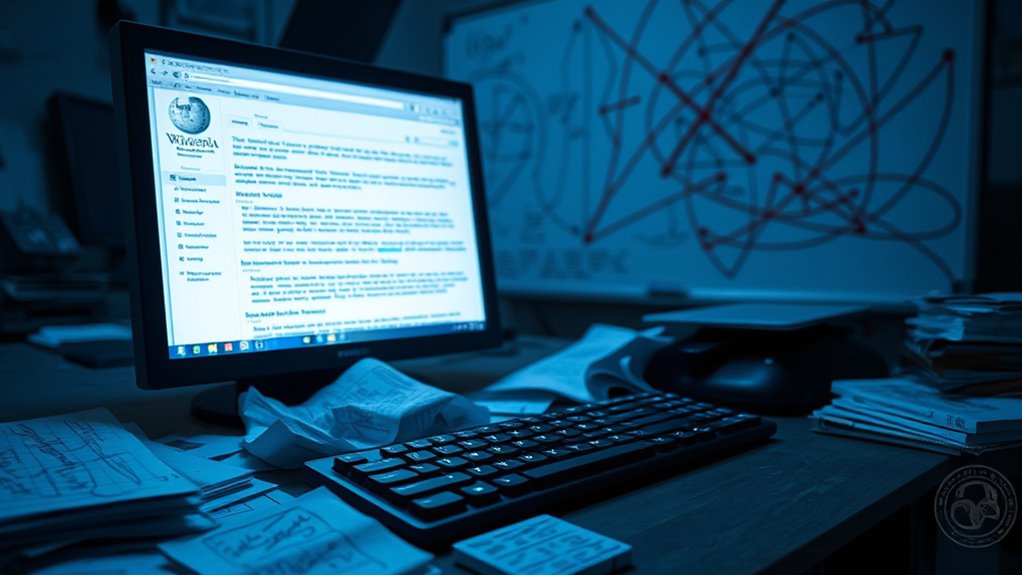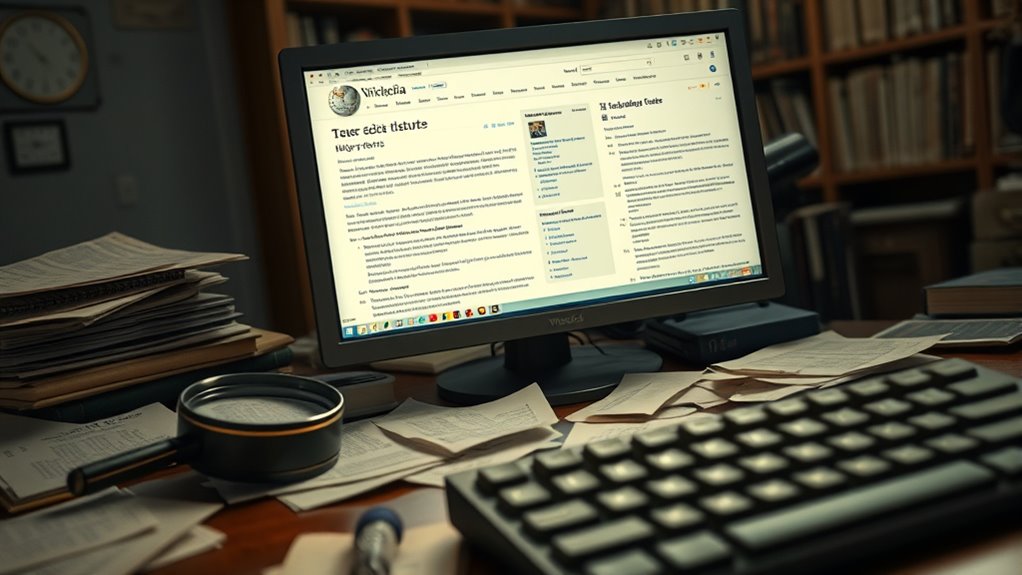When your Wikipedia page becomes a battlefield, you’ll see editors clash over facts, neutrality, and sources, turning the page into a site of fierce edit wars. Vandalism and conflicts may spread misinformation, while community guidelines and moderation efforts aim to restore accuracy. Protective measures and AI tools help manage disputes, but balancing openness with content integrity remains challenging. To understand how these conflicts unfold and how to navigate them, keep exploring the complexities behind WikiWars.
Key Takeaways
- Wikipedia pages can become battlegrounds through intense edit wars over disputed facts or neutrality.
- Vandalism and malicious edits may be introduced, requiring protective measures like page locking.
- Disputes are managed via community guidelines, dispute resolution processes, and collaborative consensus.
- AI moderation tools help prevent vandalism and maintain content accuracy and neutrality.
- Effective navigation involves diplomacy, reliable sources, and proactive protections to preserve factual information.

WikiWars is a digital phenomenon where online communities engage in intense edit battles over disputed information, often leading to widespread misinformation and controversy. When your Wikipedia page turns into a battleground, you quickly realize that maintaining accurate and neutral content isn’t as simple as clicking “edit.” Instead, you find yourself caught in a whirlwind of editorial disputes, where different editors passionately argue over what should or shouldn’t be included. These disputes can escalate rapidly, especially when conflicting viewpoints clash and tempers flare. The challenge becomes not only about presenting correct facts but also about maneuvering the often heated and sometimes biased debates that shape the page’s narrative.
As you monitor your page, you notice vandalism slipping through the cracks—intentional edits meant to distort facts, insert false information, or simply disrupt the flow of accurate content. Vandalism prevention becomes a critical aspect of managing your Wikipedia page. You may need to implement protective measures like semi-protection or full protection, which restrict editing privileges to trusted users. These steps help reduce malicious edits but also slow down genuine contributions, forcing you to strike a balance between open editing and safeguarding the integrity of the information. It’s a constant tug-of-war, where you’re trying to foster community collaboration while keeping the page free from harmful changes.
Dealing with editorial disputes demands a keen eye and patience, especially when disagreements escalate. Wikipedia’s community guidelines and dispute resolution processes are designed to help mediate conflicts, but you often find yourself in the middle of these debates, trying to advocate for accurate, unbiased content. You must provide reliable sources to back up your edits, and sometimes, you need to compromise or seek third-party arbitration to reach consensus. The dynamic nature of Wikipedia’s collaborative environment means that your page can shift multiple times a day, reflecting ongoing debates and corrections. Recognizing the importance of AI security in moderating such content can help prevent malicious edits and improve overall trustworthiness.
Throughout this process, your goal remains clear: to make certain the information remains factual, neutral, and accessible. You learn to engage diplomatically, defend credible sources, and implement protective measures proactively. Ultimately, maneuvering WikiWars requires vigilance, diplomacy, and a commitment to truth—recognizing that behind every controversial edit or vandalism attempt, there’s a community striving to shape shared knowledge. While the battles can be intense and sometimes frustrating, they also underscore the importance of collaborative effort in creating a reliable digital resource.
Frequently Asked Questions
How Do Editors Resolve Conflicts During Wikiwars?
When conflicts arise on Wikipedia, editors use conflict resolution strategies through editor collaboration. You can start by discussing disagreements on the article’s talk page, where constructive dialogue helps clarify viewpoints. If issues persist, you might involve neutral mediators like Wikipedia’s dispute resolution noticeboard. By focusing on respectful communication and common goals, you help resolve conflicts efficiently, ensuring the article remains accurate and balanced while fostering a cooperative editing environment.
What Are the Most Common Tactics Used in Wikiwars?
Imagine a tug-of-war over truth, where edit war strategies are your weapons. You often see users resorting to vigilant vandalism prevention tactics to shield pages from destructive edits. Common tactics include reverting edits swiftly, engaging in talk page discussions, and using page protection. These strategies aim to outmaneuver opponents, protect content integrity, and restore harmony, like a lighthouse guiding ships through stormy waters of conflict.
Can Wikipedia Ban Users Involved in Wikiwars?
Wikipedia can ban users involved in wikiwars through editor bans and user restrictions. If your behavior disrupts the community or violates guidelines, administrators may impose temporary or permanent bans. These measures prevent you from editing certain articles or the entire platform, aiming to guarantee constructive collaboration. So, yes, Wikipedia has the authority to restrict problematic users to maintain a neutral and respectful editing environment.
How Do Wikiwars Affect the Credibility of Wikipedia?
WikiWars can seriously harm Wikipedia’s credibility because editor bias and source manipulation often take center stage. When conflicts erupt, biased editors push their agendas, skewing information and undermining trust. Source manipulation becomes more common as users try to sway facts in their favor. As a reader, you might question the reliability of articles, making it harder to find objective, well-sourced information in an environment riddled with conflicts.
Are There Any Legal Repercussions From Wikiwars?
You might wonder if there are legal repercussions from WikiWars. While Wikipedia itself isn’t usually liable, you could face legal liabilities like defamation lawsuits if false or damaging information appears on your page. These lawsuits can arise when individuals or organizations believe their reputation is harmed. It’s essential to monitor and correct inaccuracies promptly to avoid potential legal actions and protect your reputation from harmful content.
Conclusion
So, next time you edit a Wikipedia page, remember that over 6 million articles are constantly under debate. Your small change could spark a fierce battle or bring clarity to a contentious topic. Wikipedia isn’t just a resource—it’s a battleground where knowledge is fought over. Stay aware of the conflicts and consider how your edits might influence the ongoing war for accuracy. After all, every edit counts in shaping the truth.









